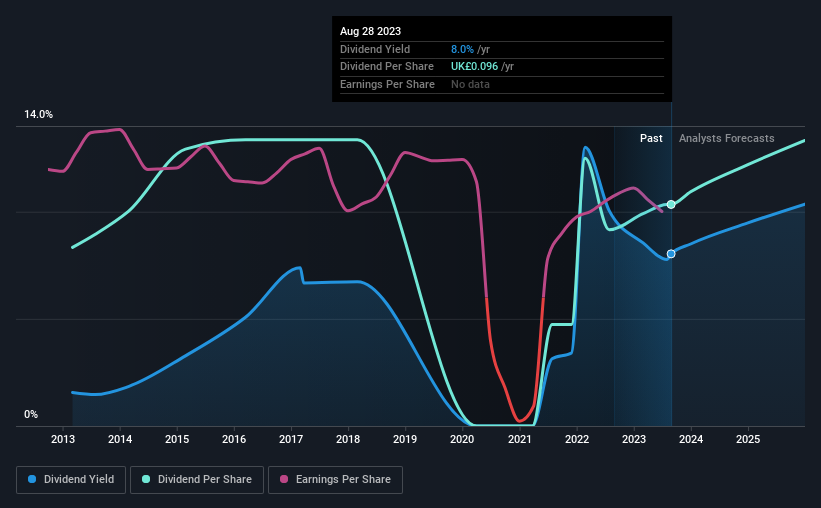International Personal Finance plc (LON:IPF) Will Pay A UK£0.031 Dividend In Two Days
Readers hoping to buy International Personal Finance plc (LON:IPF) for its dividend will need to make their move shortly, as the stock is about to trade ex-dividend. Typically, the ex-dividend date is one business day before the record date which is the date on which a company determines the shareholders eligible to receive a dividend. The ex-dividend date is important as the process of settlement involves two full business days. So if you miss that date, you would not show up on the company's books on the record date. Thus, you can purchase International Personal Finance's shares before the 31st of August in order to receive the dividend, which the company will pay on the 29th of September.
The company's next dividend payment will be UK£0.031 per share, on the back of last year when the company paid a total of UK£0.096 to shareholders. Last year's total dividend payments show that International Personal Finance has a trailing yield of 8.0% on the current share price of £1.195. Dividends are a major contributor to investment returns for long term holders, but only if the dividend continues to be paid. We need to see whether the dividend is covered by earnings and if it's growing.
See our latest analysis for International Personal Finance
If a company pays out more in dividends than it earned, then the dividend might become unsustainable - hardly an ideal situation. That's why it's good to see International Personal Finance paying out a modest 48% of its earnings.
Generally speaking, the lower a company's payout ratios, the more resilient its dividend usually is.
Click here to see the company's payout ratio, plus analyst estimates of its future dividends.
Have Earnings And Dividends Been Growing?
Stocks with flat earnings can still be attractive dividend payers, but it is important to be more conservative with your approach and demand a greater margin for safety when it comes to dividend sustainability. If business enters a downturn and the dividend is cut, the company could see its value fall precipitously. With that in mind, we're not enthused to see that International Personal Finance's earnings per share have remained effectively flat over the past five years. It's better than seeing them drop, certainly, but over the long term, all of the best dividend stocks are able to meaningfully grow their earnings per share.
Another key way to measure a company's dividend prospects is by measuring its historical rate of dividend growth. In the last 10 years, International Personal Finance has lifted its dividend by approximately 2.2% a year on average.
Final Takeaway
From a dividend perspective, should investors buy or avoid International Personal Finance? International Personal Finance's earnings per share have not grown at all in recent years, although we like that it is paying out a low percentage of its earnings. It doesn't appear an outstanding opportunity, but could be worth a closer look.
However if you're still interested in International Personal Finance as a potential investment, you should definitely consider some of the risks involved with International Personal Finance. To help with this, we've discovered 2 warning signs for International Personal Finance (1 shouldn't be ignored!) that you ought to be aware of before buying the shares.
If you're in the market for strong dividend payers, we recommend checking our selection of top dividend stocks.
Have feedback on this article? Concerned about the content? Get in touch with us directly. Alternatively, email editorial-team (at) simplywallst.com.
This article by Simply Wall St is general in nature. We provide commentary based on historical data and analyst forecasts only using an unbiased methodology and our articles are not intended to be financial advice. It does not constitute a recommendation to buy or sell any stock, and does not take account of your objectives, or your financial situation. We aim to bring you long-term focused analysis driven by fundamental data. Note that our analysis may not factor in the latest price-sensitive company announcements or qualitative material. Simply Wall St has no position in any stocks mentioned.

